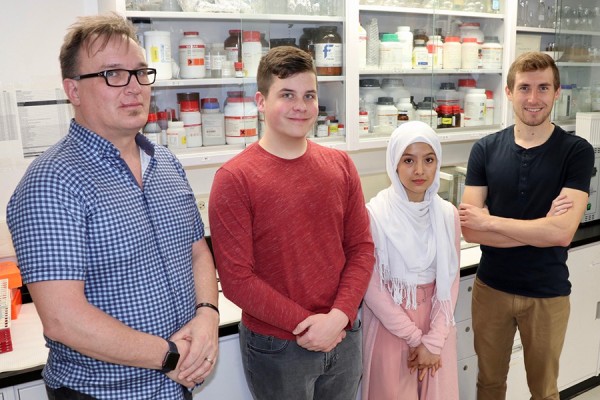 UWindsor professor Chris Weisener (left) and PhD student Nicholas Falk (right) flank Shawn Tanner and Mahnoz Akhtari, who will represent Windsor in the Canada-Wide Science Fair.
UWindsor professor Chris Weisener (left) and PhD student Nicholas Falk (right) flank Shawn Tanner and Mahnoz Akhtari, who will represent Windsor in the Canada-Wide Science Fair.
A couple of young scientists from Walkerville Collegiate Institute are headed to Ottawa to compete in the Canada-Wide Science Fair with the winning water filtration project they completed in a Great Lakes Institute for Environmental Research (GLIER) laboratory.
Shawn Tanner and Mahnoz Akhtari’s project, Using Zebra Mussels as a Water Filtration Substrate, won the duo five awards at the Windsor Regional Science, Technology and Engineering Fair (WRSTEF) in March, and an invitation to compete against 500 of Canada’s top young minds at this year’s national science fair in May.
The 12th graders initially joined earth and environmental sciences professor and GLIER researcher Chris Weisener’s laboratory as co-op students. Their work with environmental science doctoral candidate Nicholas Falk (BSc 2013, MSc 2017) evolved into their own project of using zebra mussel shells to clean polluted waste water left over from mining industrial practices.
The students created their own effluent, or acid mine drainage, by adding to water metals that would be found in a contaminated industrial site.
Akhtari says they pumped the effluent through two reactants: one pure sand and one with sand and zebra mussel shells. They tested the acidity and metal concentrations of the simulated acid mine drainage and found the shells did successfully pull out metals.
“We had a lot of help from Falk and Weisener and I learned a lot, from DNA extraction, to using a scanning electron microscope to take pictures of various reactant products from the experiments,” she says. “Now I have an edge on everyone else entering university, so I am lucky.”
Tanner says it is the shells’ bacteria that promotes the removal of metals from the effluent. Before heading to Ottawa, the two will test the bacteria community’s DNA to identify types of bacteria present in the two reactants, to add to their project.
“This research is important, and it is interesting to take something that is negative on the environment, like invasive zebra mussels, and turn it into a positive for the environment, like cleaning up industrial waste,” says Tanner.
“It was also great to be learning about current scientific technologies and theories in my high school biology class and then actually applying it to my university research.”
Falk says he was impressed to by the students who stayed committed to swinging by the lab every few weeks, all year, to take samples.
“They are really smart, obviously, and they ran with it, but I really commend them because at that age they already have a lot of other responsibilities from classes, to applying to university to sports and extracurricular activities,” he says. “So I was proud of them for wanting to come in and for getting it done.”
Tanner and Akhtari won five awards at the WRSTEF:
- Gold Medal in the Senior Division for top project.
- Al-Hijra Academy Environmental Science Award for demonstrating excellence in environmental conservation, preservation, or regeneration.
- Santec Consulting Award for projects related to application of engineering principles or research for improving the quality of our environment and/or infrastructure.
- Essex Region Conservation Authority Award for projects related to either the conservation of soil, wildlife, forests, or flood and erosion protection.
- Canada Wide Science Fair Scholarship award sponsored by ophthalmologist Robin Deans and the University of Windsor, which qualifies them to participate in the Canada-Wide Science Fair.
Both Tanner and Akhtari are future Lancers: Akhtari is set to major in biochemistry at UWindsor in Fall 2018, and Tanner will enroll in engineering.
Sara Elliott
